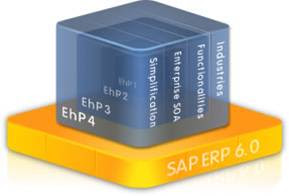 With the SAP release strategy of EhP4, there is a new mandatory tool to perform the installation/upgrade of ECC 600 ro release 604, and Netweaver components 700 to 701 (EhP1). SAPehpi (Enhacement Package Installer), acts as the SAPup tool we all know that performs upgrades from different releases. The traditional method of installation/upgrade before EhP4 was the stantard tool SAINT.
With the SAP release strategy of EhP4, there is a new mandatory tool to perform the installation/upgrade of ECC 600 ro release 604, and Netweaver components 700 to 701 (EhP1). SAPehpi (Enhacement Package Installer), acts as the SAPup tool we all know that performs upgrades from different releases. The traditional method of installation/upgrade before EhP4 was the stantard tool SAINT. I have different projects on which the use of SAPehpi is a plus (for example on the Production landscape), but was a drawback on Dev and Test systems. Why? As any upgrade project you might work in, you will find that:
- You might need to set-up a shadow instance to overcome downtime.
- For this shadow instance you will need adittional resources...
- ...Double space for DB allocation.
- ...More RAM and CPU might be needed.
If you want to perform a traditional Add-On upgrade using SAINT on your systems, oficially, you will be able to do it only on 32-bit platforms. However, most of the new systems are running now on 64-bit. If you want to perform the installation on this plataform read the following guide. Please keep in mind that this procedure is not officially supported by SAP.
- First thing to check is your SPAM/SAINT level. You will find that if you use level 34 or up you wont be able to use the tool for EHP4, as it will say that you must use EHPI to perform the installation. Level 32 and below are not handling correctly the queue for this installation and thus will not work. You need to use SPAM/SAINT level 33. There are different notes in the SAP Service Marketplace which deals with the reinstallation of a SPAM package (in case you are in level 34 or up).
- Download all the EhP4 Add-Ons upgrades, and Netweaver EhP1 Add-Ons upgrades (you might find them already packed on distributed DVDs). Also it is highly recommended that you download the lastest Support Packages for these Add-Ons.
- Proceed to unpack all the .SAR and .CAR files if necessesary and locate them in the EPS/in directory.
- Shutdown the system and upgrade your kernel to the last level of release 701. Restart it and check on the dev_w* files that the release 701 is showing up.
- Proceed to define the SAINT queue with the already downloaded EHP4 (plus NW EHP1). If you find that during the queue calculation, a newer SPAM/SAINT level is needed, remove the conflicting component from the queue and start the installation (remember to adjust accordingly the parallel R3trans and Background processes on SAINT options, based on your system resources -- to speed up processing).
- After the installation has finished, upgrade SPAM/SAINT to the last level, and perform the installation of the packages you took out of the queue in the previous step.
- You must also run into all the processes involved in a Add-On upgrade or Support Package implementation (Locked Requests, SPDD/SPAU check, etc..).
- Its a good idea thereafter to schedule SGEN as the system has been rebuilt completly.



Very nice article. You have provided a nice overview about the installation and upgrade of SAP ECC 6.0. I like all the points that you have suggested about this suite. Also many thanks for sharing about the procedure that are not officially supported by SAP.
ReplyDeletesap support package implementation